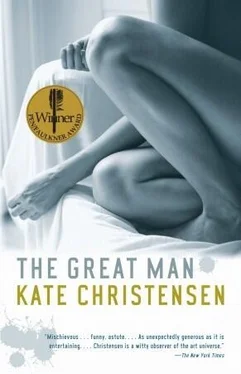“Who is Greta Church?”
“A great twentieth-century poet. Anyway, while I was almost finished researching the biography, the woman I had thought was her great-niece suddenly revealed that she was really Greta’s granddaughter, and her mother Greta’s daughter, whom Greta had given up to her younger sister to adopt at birth. I was the first person outside the family to know. She wanted the record to be straight, that was all.”
“Why are you telling me this?” Maxine asked with some uneasiness she tried to mask.
“I don’t know,” said Henry, whose inner-ear antennae, as Maxine had correctly sensed, had picked up more from her side of the conversation with Teddy than his conscious mind was yet aware of. “Maybe because Teddy — I mean Claire — suddenly wants to reconcile after so many years of this — is cold war the right term?”
“Not bad,” said Maxine, uneasy.
“What I mean is that I find it interesting how the unexpected suddenly comes to light among the living in the course of writing about a dead subject’s life.”
“What’s your book called?”
“ Sing Me a Cloud of Tears. It’s from her poem ‘The Cloud.’ It begins, ‘Sing me a wall/ Of bread so I may eat./ Sing me a cloud/ Of tears that I may feel./ Oh you choral tongues,/ You cannot know the need,/ You cannot know the terror and the need.’” He paused.
Maxine cocked her head and squinted at him. “A little melodramatic,” she said.
“No,” he said, “it isn’t when you hear the whole thing, and especially when you know about her life, it’s all in context. She was a morphine addict at the end of her life. She could hardly write.”
“Well,” she said, “that sounds very sad for her, but not so terrible in the scheme of things. Go on, recite the rest of it.”
But Chester chose that moment to empurple his face with his own cloud of tears, his own terror and need, so Maxine had to content herself with trying to imagine where on earth the poem might have gone to redeem itself from there, and what, given Henry’s evident predilection for aggrandizing mediocrity, Oscar would have made of the biographical company he was in.
That evening, Maxine stood in one corner of Michael and Natalie Rubinstein’s dauntingly enormous and radiantly lit living room, holding a sweating glass of whiskey and ice. She couldn’t see a single person she wanted to talk to. One thing about getting old was that your openness to new people shrank through the years from a naïve embrace to a narrow squint. By the time you hit old age, you barely had the ability to be civil for one minute to any stranger, let alone get through a whole evening of “interesting” conversation.
The real problem was that the human race was so disappointing. Why had she expected it to be otherwise? As a young woman, Maxine had tended to leap with open arms, like a wet-eyed, splayed-out nincompoop, toward everyone she met, but she had quickly encountered enough snideness, selfishness, neediness, cruelty, rejection, and indifference to enable her to gradually develop the social crankiness that had by now become thick and insuperable as an old toenail.
The Rubinsteins had said she should “feel free to bring a friend” tonight. Well, she had come alone in a taxi, and so what? She had left Katerina a message this morning asking her to come, but Katerina had never called her back. Of course she hadn’t, Maxine told herself with characteristic self-cruelty; she was making violent Slavic love with a Ukrainian man with ice blue eyes, a man who was good with his hands. Anyway, being here with Katerina, standing shoulder-to-shoulder with her, aware of the warmth of her skin, would only have made her feel even more abject and lovelorn.
She swallowed some whiskey and enjoyed the hot-cold burn in her gullet. It was that awkward hour when people were still arriving and no one was drunk yet and the hors d’oeuvres were off to a slow start. Even more so than usual, Maxine didn’t feel like talking to anyone tonight, but luckily for her, an ugly and unfashionable old woman standing alone generally attracted no attention. As long as she could keep herself out of Natalie’s sight line, she might be left in peace to eat her dinner unnoticed while everyone around her talked among themselves, then thank the hosts before dessert, make a hasty getaway, and be home in bed by 10:30. Everyone was secretly glad when old people had to leave early.
“Oh, you can’t ever believe what he says,” she heard a male homosexual voice announcing just behind her.
“I always believe him,” said a slightly deeper but just as obviously homosexual voice. “That’s my problem.”
“Your problem,” said the first voice, “is that you believe everyone. You’re such a child.”
They were speaking softly, not theatrically, so Maxine assumed they were a couple and this conversation was private, which only made her want to eavesdrop more. She half-turned so she could see who they were, and with a flash of a glance, she beheld two slenderly muscular young men with identical haircuts, short and sleek as ocelot pelts over their scalps, which accentuated their features. One of them was exotically olive-skinned and black-haired, with almond-shaped eyes. The other, a redhead with bright blue eyes, had a tricky complexion, the pale, mercurial kind that flushed easily and sunburned badly and broke out in pimples and rashes and boils.
“I’m not a fucking child,” said the redhead.
“About him you are,” said the olive-skinned one. He caught Maxine’s eye, realized she was listening, and looked blandly away.
Natalie Rubinstein appeared in front of Maxine with a glass of red wine in one hand and kissed her on both cheeks. She wore a very expensive-looking, subtly matronly sleeveless burgundy silk dress that showed off her full breasts and her round, dusky arms without eroticizing her in any way. Her dark hair tumbled around her shoulders; her brown eyes glowed with the ease and goodwill born of the confluence of financial security and a lucky disposition apparently free of fatal introspection.
“Maxine,” she said, “I’m so sorry. I got waylaid. I’m so glad you’re here! How are you?”
“I’ve been better, truthfully,” said Maxine, but she smiled back at her hostess. Natalie was the devoted, unflappable mother of three small children, a self-professed “huge, huge fan” of Maxine’s work, and also, it happened, the wife of Maxine’s longtime dealer, Michael Rubinstein. In spite of herself, Maxine genuinely liked her — it was impossible not to — although she didn’t understand a thing about Natalie, and vice versa.
“Oh, why?” said Natalie.
Maxine waved a hand. “Old age is nothing but a big drag. Do everything you can to stave it off.”
“Seth and Charles,” said Natalie, “come here and meet Maxine Feldman. She’s a great, great, great, very famous painter Michael has the incredible honor to represent.”
The two homosexuals dropped their conversation and obediently extended their hands to Maxine. Their hands were smooth and warm as suede.
“Seth’s my little brother,” said Natalie, slipping her arm through the olive-skinned boy’s and drawing him closer so he had to enter Maxine’s radius. Charles automatically followed Seth as if by magnetic pull; now they formed a little social clump, which had, of course, been Natalie’s aim all along. “He’s visiting us from Chicago.”
Seth glanced at his sister, a complicated look filled with roughly equal parts affection and bemusement; Maxine imagined that the latter was caused in a larger sense by something to do with his visit, but more immediately by being forced to make conversation with the old bag who’d been spying on his private conversation a second before.
Читать дальше












